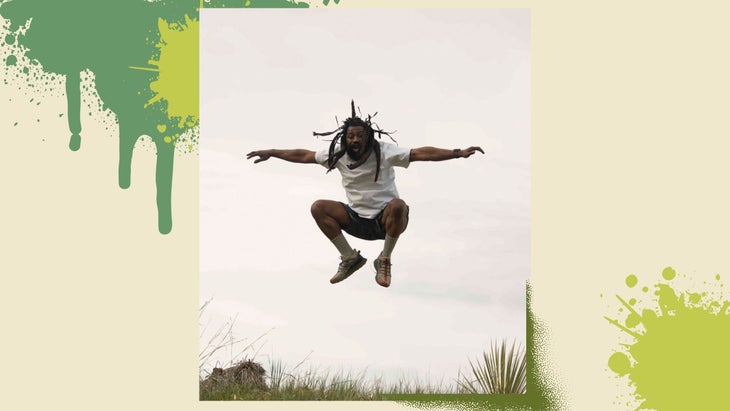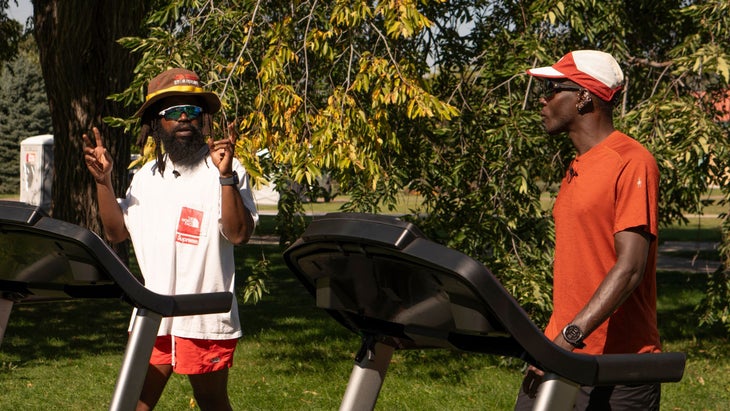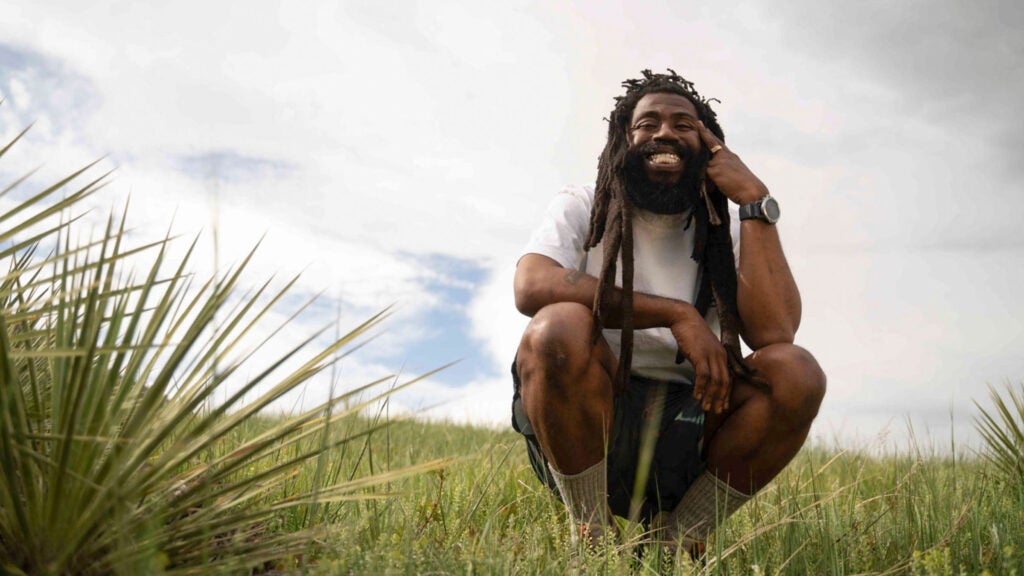No products in the cart.
Outdoor Adventure
How Malik Tha Martian Became an Outdoor Filmmaker
Malik Martin, better known as Malik Tha Martian, has carved a niche for himself in the outdoor industry as a photographer and filmmaker. Born in Memphis, Tennessee, and now living in Denver, Martin filmed and appeared in the project Black Ice, a documentary about a group of Memphis rock climbers who learn to ice-climb in Montana. He’s also the subject of a short film, Malik, about his friendship with mountaineer Conrad Anker, and the host of A Walk in the Park—a series for Outside TV in which he interviews influential people in the outdoor world while the pair walk on treadmills in a park.
Martin began his career as a photojournalist. In 2017, at age 27, he started freelancing for the Tri-State Defender in Memphis. His photos of the raw energy and tumult during the protests that led to the dismantling of Confederate statues garnered him a promotion to a full-time position. In 2018, while photographing the opening of the nonprofit climbing gym Memphis Rox, he decided that he wanted to participate, not just document, and began climbing indoors. Soon after, a Colorado road trip that included hiking in Rocky Mountain National Park ignited his interest in the outdoors and a passion for nature photography. Today, Malik not only captures stunning visuals but sparks important conversations about diversity and inclusion in urban and outdoor spaces.
Martin discussed his unique journey in a series of interviews with Outside.

Outside: Can you share some insights into your youth? How did those early years influence your career path?
Martin: I was adopted by my grandmother when I was two and moved to Salt Lake City, because she felt it would give me a better chance at life compared with Memphis. My elementary years were spent experiencing extreme racism, being one of the only Black kids in my school. The mountains were there, but they were no more than something to look at. I never thought about hiking or climbing them, even though I did camps as a youth. These experiences didn’t directly influence my career, but they gave me a fighting spirit and taught me to never be afraid to speak truth to power.
What led you to become a photojournalist?
I wanted to make a living off my camera. Initially, getting booked for birthdays and baby showers was cool, but I needed something more dynamic. I remember walking into the Tri-State Defender without an appointment, to show the lead editor my portfolio, and saying, “I want to be a photojournalist.” He looked over my work and responded, “I think you already are.”
What do you focus on in your work?
Things I love. When you shoot things you love, you can never make them look bad.
You’ve mentioned living in a tent for a period of time. What led to that situation, and how did the experience shape you?
In May 2016, I chose to live in a tent to escape a bug-infested apartment run by a slumlord. I realized I could cut back on expenses like rent and utilities to focus on my art. For the next six months, I camped and couch surfed, investing in myself rather than paying rent. I had an extra $1,000 a month that I could put into camera equipment instead of bills. This period taught me the importance of betting on myself, especially during times of uncertainty.
What about the experience in Rocky Mountain National Park made you fall in love with nature?
I don’t know, it just felt weird and I kind of liked it. Initially, I thought maybe the thin air was giving me a natural high, but it also made it hard to breathe, yet I couldn’t stop moving forward. I had never felt such euphoria. The mountains spoke to me in a way the city never could. They taught me about silence, depth, and the wildness of spirit.

How did you meet Conrad Anker, and how has that relationship influenced your career and personal growth?
I met Conrad at Memphis Rox during Global Climbing Day, organized by the North Face, in August 2018. He immediately helped me with technical skills like rigging ropes and positioning myself on the wall to capture great shots. Conrad has been like a mountain dad to me, profoundly changing my life and career trajectory. After observing my coverage of the Black Lives Matter protests in 2020, he invited me on a trip to clear my mind. This trip turned out to be a two-week expedition where I climbed the Granite Peaks in Montana and the Grand Teton in Wyoming with Jimmy Chin.
What projects are you currently working on?
My current project is Outside Ain’t Free. It’s my first completely independent film and focuses on the challenges of accessing the outdoors when you live in a concrete jungle. It questions the notion that the outside is free by highlighting barriers like a lack of gear and knowledge needed to safely navigate the backcountry.
When did you start writing poetry? Is it a hobby or have you considered publishing your work?
I’ve been writing poetry my whole life, walking around in third grade with Edgar Allan Poe’s book of poems. Over the years, it took me a while to find my style and approach. Poetry is more than a hobby; it’s a crucial mode of personal expression. It allows me to convey emotions and experiences that may not always come through in my visual work. I haven’t had anything published. There are just some things I keep private.
We’re all aware of the lack of diversity outdoors, and obviously you stand out. Can you discuss the impact of imposter syndrome on pursuing aspirations, particularly in environments where you might feel out of place?
I’m supposed to be here. In the early stages, I was adjacent to the big names, but now I’m becoming one myself. I used to look at all these great names on posters, admiring their achievements. But now my name is on the poster, too. I’m doing great things, and I’m supposed to be here.
You are. But how do you react when someone doesn’t feel the same?
I have tried to join groups of people that have the same interests as me and haven’t been offered a seat. So why not build my own table? While they’re at their table enjoying themselves, I’ll be over here, gathering nails, hammering the wood, sanding, and building chairs. They’ll look up and see that while they were busy excluding, I created a space for me and whoever else to thrive, share ideas, and eat.
A Poem About the Poet
As someone who has grappled with stuttering, I’ve often sought solace and inspiration in the words of great orators like Maya Angelou. Her mastery of language has guided my own pursuit of expressive power. Martin shares a reverence for Angelou, too. Speaking to him inspired me to write a poem in her style.
Malik the Lens, Malik the Light
In Memphis beats a heart, unquiet
A spirit fierce, refusing to deny it.
Malik, with a camera as his sword
Cuts through silence, his unspoken word.
From humble streets to mountain’s breath
His journey sings, defying death.
With each snap, a new world unfurls
Canvas of dreams, his lens swirls.
Poet first, through streets he roamed
Each photograph, a verse, a tome.
To the stars, his gaze now cast
In every frame, his future, his past.
He built a table, long and wide
Inviting all to come, reside.
By firelight of stars and flash
His community, his mosaic, his bash.
Through city’s pulse and nature’s calm
Malik moves, his soul his balm.
A Martian, they say, in jest, in mirth
For he brings the heavens down to earth.
Photographer, wanderer, seeker, friend
On each journey, he finds his mend.
Through lens and heart, he charts his course
With nature’s power, his endless source.
A Walk in the Park with Malik Tha Martian is now available on Outside Watch.

